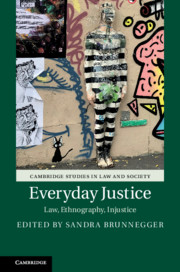Book contents
- Everyday Justice
- Cambridge Studies in Law and Society
- Everyday Justice
- Copyright page
- Contents
- Contributors
- Acknowledgments
- Chapter One Theorizing Everyday Justice
- Part One Im/possibilities of Everyday Justice
- Part Two The Force of Everyday Justice
- Part Three Everyday Justice Unbound
- Afterword
- Index
- Cambridge Studies in Law and Society
- References
Part Two - The Force of Everyday Justice
Published online by Cambridge University Press: 28 November 2019
- Everyday Justice
- Cambridge Studies in Law and Society
- Everyday Justice
- Copyright page
- Contents
- Contributors
- Acknowledgments
- Chapter One Theorizing Everyday Justice
- Part One Im/possibilities of Everyday Justice
- Part Two The Force of Everyday Justice
- Part Three Everyday Justice Unbound
- Afterword
- Index
- Cambridge Studies in Law and Society
- References
Summary

- Type
- Chapter
- Information
- Everyday JusticeLaw, Ethnography, Injustice, pp. 81 - 132Publisher: Cambridge University PressPrint publication year: 2019

